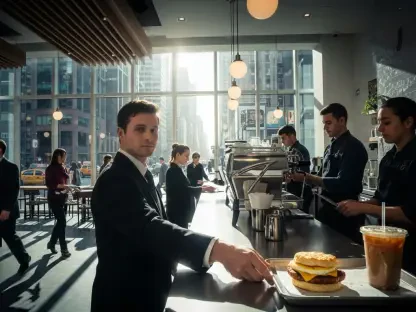Today, we’re thrilled to sit down with Katarina Railko, a seasoned expert in hospitality with deep roots in the travel and tourism industry. Katarina has also carved out a significant role as a thought leader in entertainment and events, particularly in the realm of expos and conferences. In this conversation, we dive into the transformative potential of the UK events sector, exploring how targeted government support could fuel economic growth, create jobs, and position the UK as a global leader in this dynamic industry. From unlocking billions in trade to addressing fiscal challenges, Katarina shares her insights on why events are a cornerstone of national prosperity and what needs to happen next.
Can you give us a snapshot of the UK events industry and why there’s an urgent push for government support ahead of the Autumn Budget in November 2025?
Absolutely, William. The UK events industry is a massive economic driver, contributing £61.5 billion in direct consumer spending and over £200 billion in trade, research, and innovation each year. It’s not just about concerts or festivals; it encompasses business conferences, trade shows, and cultural events that bring people and ideas together. We’re reaching out to the Chancellor now because, with the right support, we believe this sector can unlock an additional £14–18 billion in economic activity annually. The Autumn Budget is a critical moment to align fiscal policies with the industry’s potential for growth and job creation.
How did you arrive at the estimate of £14–18 billion in extra trade and consumer activity each year if the right policies are put in place?
That figure comes from a detailed analysis of current industry trends, untapped market opportunities, and the multiplier effect of events. When you host a major conference or expo, for instance, you’re not just generating ticket sales; you’re boosting local businesses, hotels, transport, and even inspiring innovation through networking. We looked at case studies of regions and sectors that have seen growth after targeted investments, and we modeled how scaling up support—whether through tax reliefs or marketing programs—could amplify spending and trade across the UK. It’s a conservative estimate, honestly, given the global demand for high-quality events.
Speaking of growth, there’s talk of creating up to 100,000 new jobs with this boost. What types of roles are we looking at, and where might they emerge across the UK?
These jobs span a wide range, from event planners and marketing specialists to technicians, logistics coordinators, and hospitality staff. You’ve also got roles in creative production, like set designers and digital content creators, which are increasingly vital. Many of these opportunities would likely emerge in regional areas outside of London, where there’s huge potential to host more events but often a lack of infrastructure or funding. Think places like Manchester, Birmingham, or smaller towns that could become hubs for niche expos or cultural festivals with the right support.
The events industry already drives a staggering amount of economic value. What is it about events that makes them such a powerhouse for the UK economy?
Events are unique because they create a ripple effect. A single trade show can attract international businesses, leading to deals worth millions, while also filling hotels, restaurants, and local shops. They’re a magnet for tourism and inward investment, and they often spark innovation by connecting people face-to-face—something virtual platforms can’t fully replicate. Plus, events showcase the UK’s creativity and expertise on a global stage, reinforcing our reputation as a place to do business or visit for leisure. That £200 billion in trade and innovation isn’t just a number; it’s a testament to how events knit together so many economic threads.
With around 700,000 jobs currently supported by this sector, can you paint a picture of who these workers are and the diversity of roles involved?
It’s a really broad spectrum. You’ve got event organizers who dream up and manage the big ideas, technicians who handle sound, lighting, and staging, and then a whole army of support staff—caterers, security, transport workers. There are also freelancers in creative fields, like graphic designers or videographers, and permanent staff at venues who keep the wheels turning. It’s a mix of skilled and entry-level roles, often providing opportunities for young people or those in regional communities to build careers. What’s amazing is how interconnected these roles are; everyone plays a part in making an event come to life.
One of your key requests is extending reliefs for new and regional event productions. Why are these reliefs so crucial, especially for smaller or regional events compared to larger urban ones?
Smaller and regional events often operate on razor-thin margins. Unlike big-budget events in London or other major cities, they don’t always have access to large sponsorships or established audiences. Reliefs—whether tax breaks or grants—can make the difference between hosting an event or scrapping it. They help cover upfront costs like venue hire or marketing, which are huge barriers for new productions or those in less central locations. Supporting these events also spreads economic benefits more evenly across the UK, helping to level up regions that might otherwise miss out.
You’ve also advocated for expanding VisitBritain’s Business Events Growth Programme. Can you explain what this initiative does and how scaling it up would benefit the sector?
The Business Events Growth Programme is a fantastic tool run by VisitBritain to promote the UK as a top destination for international conferences, trade shows, and corporate events. It provides funding and support for bids to host major global gatherings and helps market the UK to decision-makers abroad. Expanding it would mean more resources to attract high-value events, which in turn bring in international delegates who spend heavily on travel, accommodation, and local services. It’s a direct way to boost trade and tourism while showcasing the UK’s strengths in innovation and hospitality.
Another focus is reforming business rates and stabilizing VAT for venues and suppliers. How are the current policies creating challenges, and what changes are you hoping for?
Right now, high business rates and fluctuating VAT put a real squeeze on venues and suppliers. Many smaller venues, especially outside major cities, struggle to cover these costs, which can lead to closures or scaled-back operations. For suppliers—think catering or equipment rental—these taxes eat into already tight budgets, making it harder to invest in growth or innovation. We’re pushing for reforms that lower these burdens, perhaps through tiered rates based on location or revenue, and a more predictable VAT structure that lets businesses plan ahead without fear of sudden hikes.
There’s also a call for exploring National Insurance reliefs for event-driven industries. Can you unpack what you mean by “event-driven industries” and why this relief matters?
Event-driven industries are those directly tied to the success of events—think venues, production companies, catering firms, and even freelance creatives who rely on events for their livelihood. National Insurance contributions can be a heavy load, especially for smaller businesses or seasonal workers in this space. Offering reliefs would reduce operating costs, allowing these companies to hire more staff or reinvest in their services. It’s about creating breathing room for an industry that’s often cyclical and faces unpredictable demand, ensuring they can weather lean periods and scale up when opportunities arise.
You’ve noted that these measures could help the UK stand tall against competitors like Paris, Dubai, and Singapore. What are these cities doing differently that’s giving them an edge in the events arena?
These destinations have invested heavily in their events infrastructure and offer very attractive incentives. Paris, for instance, has world-class venues and government-backed marketing to lure international events, often with tax breaks for organizers. Dubai focuses on luxury and innovation, positioning itself as a futuristic hub with state-of-the-art facilities and aggressive tourism campaigns. Singapore combines strategic location with financial support for business events, making it a go-to for Asia-Pacific conferences. The UK has the talent and reputation, but we need similar bold policies—modernized taxes, funding for regional venues, and global promotion—to keep pace and draw those big-ticket events here.
Looking ahead, what’s your forecast for the UK events industry over the next few years if the right support is secured?
If we get the support we’re advocating for in this Autumn Budget, I’m incredibly optimistic. We could see the industry not just recover but lead globally, with growth in both economic impact and job creation. I’d expect a surge in international events choosing the UK as their host, alongside a flourishing of regional festivals and expos that diversify our cultural and business landscape. We’d solidify our position as a hub for creativity and connection, driving billions more in trade and tourism. It’s not just about numbers; it’s about building a legacy where every corner of the UK feels the benefits of this vibrant sector.









